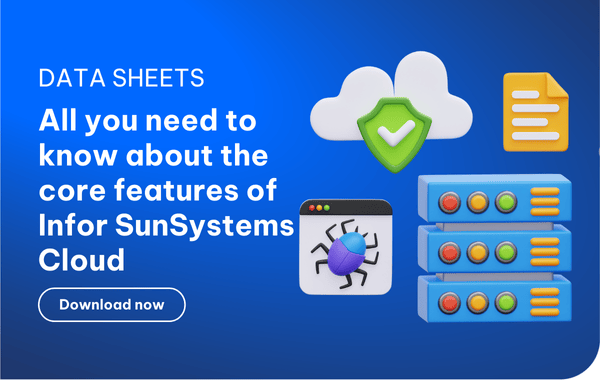Operating any business is challenging. As a business owner, you have to wear multiple hats, and the last thing you want to worry about is keeping track of every single receipt. Thus, it is understandable to overlook the accounting function as you are trying to balance your time as much as possible.
However, it is utterly crucial to straighten up your cash flow, budget, and payroll right from the start. This article will equip you with the fundamental information you need to know about accounting.
Read more: Scaling Your Business With Infor Sunsystems Cloud
Contents
- Why is accounting essential to businesses?
- Why should companies leverage accounting software to overcome challenges?
- What features does an accounting system need to have?
- List of accounting software to help you get started

Why is accounting essential to businesses?
Undoubtedly, the ultimate goal of a company is to earn a profit. To do that, a company needs to improve its bottom lines by increasing its revenues and improving efficiency (or reducing unwanted expenses). As an owner, effective accounting practices let you make strategic decisions and better understand where resources go.
Moreover, accounting is beneficial in:
- Providing an overview of the current financial health of the business
- Keeping track of past spending to prepare for the future
- Staying on top of receivables and debts
- Presenting financial information to external stakeholders and third parties for auditing and tax purposes
- Examining the company
- Company's strengths and weaknesses
- Evaluating investment opportunities, analysing competitors, etc.
Read more: Why management accounting is essential for sustainable success?
Accounting vs Bookkeeping, which one do you need?
Both accounting and bookkeeping essentially have to do with numbers and figures. Bookkeeping simply means keeping track of all your financial records. Accounting is a more complex process that requires you to interpret those financial records to pay the right amount of tax and make accurate decisions based on the company's performance.
Both practices are vital to any business. The bottom line is to keep a good record of all transactions. Moreover, if you have investors or you are trying to acquire a business loan, you may need to prepare detailed financial reports with easy-to-understand figures. Thus, this is a factor to keep in mind when deciding which practice to carry out in your business.
Deciding on an accounting method
The accounting method comprises rules that companies must follow when reporting their revenues and expenses. In some cases, like in the US, the Internal Revenue Service (IRS) requires businesses to diligently follow one method to refrain taxpayers from manipulating their reports and minimising their tax burdens as a result.
There are two primary accounting methods:
- Cash accounting: the simplest and most common method for small businesses. Typically, this cash accounting immediately records all funds that come in and out. For example, when a bill is paid, it is recognised as an expense. Or when you receive money from the clients, it is recorded as revenue.
- Accrual accounting: this method helps businesses obtain a more accurate picture of the current situation. It records transactions as they are earned and incurred, not when the funds come in or out. In other words, a sale order is accounted for as revenue despite no actual money has been received yet. Accrual accounting is used by the majority of accountants globally and is the recognised standard for GAAP and IFRS (EU) accounting. Though complex, this method offers a long-term overview for you and investors to make informed decisions.
Once you have identified the type of accounting method you want to follow, another factor to keep in mind is determining what sort of financial records you want to keep track of, this could encompass everything that shows income, expenses, deductions, or credits.
Read more: 3 tips to effectively manage your T&E expenses
Documents and receipts should not be tossed after entering into your accounting system or reporting to the tax agency. In some countries, the law requires you to hold on to these documents for at least a couple of years, which is one of the reasons why the accounting department generates loads of paperwork and needs dedicated storage space.
Accounting terms 101
You might be juggling with other commitments, but it is critical to understand the basics of accounting besides the two terms accounting versus bookkeeping mentioned above.
- Chart of accounts: a tool that helps you to categorise all of your financial transactions (or accounts) that occurred during an accounting period. Main account types include Revenue, Expenses, Assets, Liabilities, and Equity.
- General ledger: once all transactions are posted to the chart of accounts, they are then summarised in the general ledger, which is then used to produce a trial balance. General ledger features debits and credits - a commonly seen double-entry bookkeeping method.
- Financial statements: a set of three statements that give you a summary of all financials: the balance sheet (showcases a company's net worth), the income statement (describes the financial performance, or profit and loss, during an accounting period), and the cash flow statement (demonstrates how much cash was generated and distributed).
Read more: Global management accounting principles explained in 800 words
Why should businesses leverage accounting software to overcome challenges?
A steady cash flow brings more juice to carry out your projects and keep the company running. Cash flow bottleneck is one of the most common challenges that most businesses face. Staying on top of your finances and cutting back on unnecessary expenses are not enough if you do not account for unexpected events, such as a natural disaster or an unexpected lawsuit. Even minor, one-off expenses might also consume a large chunk of your funds.
Most businesses also overlook the payroll and tax aspects. These are both vital and unavoidable to any business. Nevertheless, these tasks are time-consuming as tax requirements vary based on a multitude of factors, and payroll procedures are too complex to be handled in-house.
These matters can quickly become out of hand if you are manually keeping track of your financial information, optimising cash flow, figuring out the number of tax deductions, paying your staff plus other critical tasks. You need a dedicated system to handle the daily accounting issues, especially when your business starts to grow.
What features does an accounting system need to have?
There currently are a variety of promising solutions to choose from in the accounting software market. It is easy to get overwhelmed as you go through and evaluate each solution to find the most suitable one for your business.
Thus, what are the must-have functionalities in accounting software? These are the basic ones you should keep in mind, but also note that there could be very few solutions that have all of these features as well as match your specific needs and budget.
- Accounts payable: to monitor the amount that you owe to suppliers or creditors.
- Accounts receivable: to track the amount owed to you.
- Bank reconciliation: to match the balance in cash accounts with a bank statement to determine and address any differences.
- Billing and invoicing: to create, manage, and keep track of all bills and invoices.
- Expense tracking: to record all expenses.
- Fixed asset: to keep track of your fixed assets, including their depreciation rates.
- Payroll: to timely pay your employees, thus, avoiding any unwanted lawsuits.
- Project accounting: also known as job cost accounting, which allows you to monitor the financial progress of each of your projects.
In addition to these functions, other important features you can consider when shopping for a solution includes:
- Fund accounting: to record your resources acquired through grants, donations or other sources. This function focuses on accountability rather than profitability and is mostly used by non-profit organisations and governments.
- Purchase orders: to control the purchase of products or services from a supplier.
- Tax management: to avoid risks, and late tax payments, and ensure compliance.
Read more: Solving 5 Common Accounts Payable Issues with Automation
List of accounting software to help you get started
In the era of Industry 4.0 today, technology has become so advanced, and there are countless cloud-based and user-friendly solutions created to enable us to automate mundane tasks as well as allow us to access timely data whenever and wherever.
Aside from dedicated software and tools for CRM or sales and marketing, you can also easily find information about accounting systems. Here are a few popular names in the accounting realm to get you started:
Infor SunSystems
Typically, Infor SunSystems is used for larger-sized corporations, but with its latest rendition, SunSystems Cloud, it can be deployed in the cloud to accommodate a wider client network. Furthermore, SunSystems is now part of Infor OS, which brings you endless integration possibilities with other Infor and non-Infor applications to suit your needs.
An advantage of Infor's solutions is the user experience, which has always been the central focus of every product development of Infor.
With SunSystems, you can feel at ease communicating with your staff, viewing financial insights, effectively managing documents, approving reports, and automating and running tasks in the background with the help of its built-in AI.
Read more: A Comprehensive Overview of Infor SunSystems Cloud Core Modules
FreshBooks
FreshBooks is one of the most-talked-about cloud accounting apps, which is capable of streamlining tasks like invoicing, organising expenses, tracking and following up with clients, and more; all can be done via its intuitive dashboards. The solution also comes with a mobile app, which allows you to tab into critical financial insights practically anywhere.
The app integrates well with popular third-party platforms, such as Shopify, PayPal, and G Suite to enhance its functionalities and meet your requirements.
QuickBooks Online
Affordable is what describes this web-based accounting solution. QuickBooks Online offers all essential, mobile-friendly tools to carry out your daily accounting tasks from recording expenses to creating your own branded invoices, reconciling bank and credit transactions, and many more. It also allows you to generate reports based on your preferred data to easily grasp insights into your performance.
Xero
A highly regarded financial application, trusted by many small businesses regardless of industry. Xero takes pride in providing a hassle-free experience for users and an impressive integration capability with over 600 apps.
Thus, you have a powerful solution that empowers you to handle practically anything, from document management to inventory, payment processing, invoicing, payroll and HR, reporting, bills and expenses, and many more. What's more, Xero also offers tools to help you reconcile foreign transactions with hourly updated exchange rates.
Sage Business Cloud Accounting
Another simple, secure yet robust accounting solution that features numerous automation, integrations, and a modern UI to help boost user productivity. Sage Business Cloud Accounting allows you to run your total tax liabilities to help you plan well in advance, thus ensuring you stay compliant with the latest legislation. Its cash flow forecasting capability and unlimited user offerings are also worth considering.
The bottom line
A BCSG survey stated that 94% of small businesses struggle to find support in financial management, and 70% of them deem themselves beginners in this particular field as well as marketing and HR when they first started.
This only further emphasises the importance of having suitable software that fits your needs. As your business grows, having a system to organise and streamline your finances is critical, thus, providing you with the complete picture of the business' current performance and areas of opportunity. Whichever option you choose, a reliable solution from a trusted vendor will only help your business grow.
To help you get started on your research, TRG has collated several useful resources just for you right here. Click any of the links below to explore how advanced technologies can help transform your business.
An introduction to accounting software
Fundamentals of cloud services
 English
English  Vietnamese
Vietnamese 




